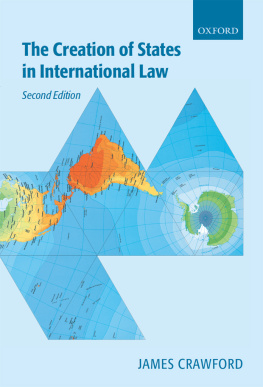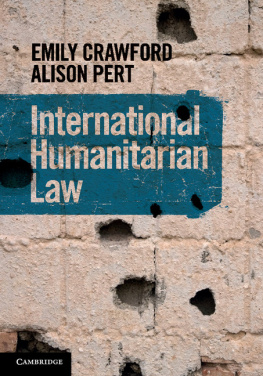James Crawford - Brownlies Principles of Public International Law
Here you can read online James Crawford - Brownlies Principles of Public International Law full text of the book (entire story) in english for free. Download pdf and epub, get meaning, cover and reviews about this ebook. year: 2019, publisher: Oxford University Press, genre: Humor. Description of the work, (preface) as well as reviews are available. Best literature library LitArk.com created for fans of good reading and offers a wide selection of genres:
Romance novel
Science fiction
Adventure
Detective
Science
History
Home and family
Prose
Art
Politics
Computer
Non-fiction
Religion
Business
Children
Humor
Choose a favorite category and find really read worthwhile books. Enjoy immersion in the world of imagination, feel the emotions of the characters or learn something new for yourself, make an fascinating discovery.

- Book:Brownlies Principles of Public International Law
- Author:
- Publisher:Oxford University Press
- Genre:
- Year:2019
- Rating:4 / 5
- Favourites:Add to favourites
- Your mark:
- 80
- 1
- 2
- 3
- 4
- 5
Brownlies Principles of Public International Law: summary, description and annotation
We offer to read an annotation, description, summary or preface (depends on what the author of the book "Brownlies Principles of Public International Law" wrote himself). If you haven't found the necessary information about the book — write in the comments, we will try to find it.
Brownlies Principles of Public International Law — read online for free the complete book (whole text) full work
Below is the text of the book, divided by pages. System saving the place of the last page read, allows you to conveniently read the book "Brownlies Principles of Public International Law" online for free, without having to search again every time where you left off. Put a bookmark, and you can go to the page where you finished reading at any time.
Font size:
Interval:
Bookmark:
OXFORD
BROWNLIES PRINCIPLES OF
PUBLIC INTERNATIONAL
LAW

JAMES CRAWFORD
Malarial com diretes autarats
BROWNLIES PRINCIPLES OF
PUBLIC
INTERNATIONAL
LAW
Ninth Edition
BY
JAMES CRAWFORD, SC, FBA
OXFORD
UNIVERSITY PRESS

UNIVERSITY PRESS
Great Clarendon Street, Oxford, 0X2 6DP,
United Kingdom
Oxford University Press is a department of the University of Oxford.
It furthers the Universitys objective of excellence in research, scholarship,
and education by publishing worldwide. Oxford is a registered trade mark of
Oxford University Press in the UK and in certain other countries
Estate of Sir Ian Brownlie and James Crawford 2019
The moral rights of the author have been asserted
Sixth edition 2003
Seventh edition 2008
Eighth edition 2012
Impression: 1
All rights reserved. No part of this publication may be reproduced, stored in
a retrieval system, or transmitted, in any form or by any means, without the
prior permission in writing of Oxford University Press, or as expressly permitted
by law, by licence or under terms agreed with the appropriate reprographics
rights organization. Enquiries concerning reproduction outside the scope of the
above should be sent to the Rights Department, Oxford University Press, at the
address above
You must not circulate this work in any other form
and you must impose this same condition on any acquirer
Public sector information reproduced under Open Government Licence v3.0 ( http://www.nationalarchives.gov.uk/doc/open-government-licence/open-government-licence.htm )
Published in the United States of America by Oxford University Press
198 Madison Avenue, New York, NY 10016, United States of America
British Library Cataloguing in Publication Data
Data available
Library of Congress Control Number: 2018964838
ISBN 978-0-19-257702-3
Printed in Great Britain by
Bell & Bain Ltd., Glasgow
Links to third party websites are provided by Oxford in good faith and
for information only. Oxford disclaims any responsibility for the materials
contained in any third party website referenced in this work.
OUTLINE CONTENTS
PART I PRELIMINARY TOPICS
PART II PERSONALITY AND RECOGNITION
PART III TERRITORIAL SOVEREIGNTY
PART IV LAW OF THE SEA
PART V THE ENVIRONMENT AND NATURAL RESOURCES
PART VI INTERNATIONAL TRANSACTIONS
PART VII STATE JURISDICTION
PART VIII NATIONALITY AND RELATED CONCEPTS
PART IX THE LAW OF RESPONSIBILITY
PART XI DISPUTES
CONTENTS
Glossary Ixxxii
PART I PRELIMINARY TOPICS
PART II PERSONALITY AND RECOGNITION
- Recognition of Governments 141
PART III TERRITORIAL SOVEREIGNTY
PART IV LAW OF THE SEA
- The Seabed and Ocean Floor Beyond the Limits of National Jurisdiction 310
PART V THE ENVIRONMENT AND NATURAL RESOURCES
USE OF NATURAL RESOURCES 317
PART VI INTERNATIONAL TRANSACTIONS
- Unilateral Acts 402
- Acquiescence 405
PART VII STATE JURISDICTION
PART VIII NATIONALITY AND RELATED CONCEPTS
- Nationality of Corporations 512
PART IX THE LAW OF RESPONSIBILITY
PART X THE PROTECTION OF INDIVIDUALS AND GROUPS
DIPLOMATIC PROTECTION AND PROTECTION
OF INVESTMENTS 591
- Conclusion 663
PART XI DISPUTES
- Conclusion 691
- Conclusion 716
- Conclusion 748
Index

Preface
James Crawford SC, FBA
From: Brownlie's Principles of Public International Law (9th Edition) James Crawford
Previous Edition (8 ed.)
Content type: Book content
Product: Oxford Scholarly Authorities on International Law [OSAIL]
Published in print: 09 July 2019
ISBN: 9780198737445
It is difficult to overestimate the importance of successive editions of Ian Brownlie's Principles for the teaching of international law over the past half century. It is not too much to say that several generations of Anglophone international lawyers have absorbed their sense of the structure of their subject from Principles . It was both an honour and responsibility to undertake an eighth edition following Ian Brownlie's tragic death in January 2010. This ninth edition follows some seven years later and captures the plethora of developments in international law which have occurred in the intervening period.
Ian was used to describing Principles as a 'legal handbook', but it was always much more than that, seeking to cover the broad subject matter of international law in 13 Parts and 32 chapters. In the eighth edition, these were somewhat simplified into 11 Parts and 33 chapters (with the introduction of an Introduction). Although there was some reorganization of Parts and chapters, the structure and the approach of this edition was recognizably that of earlier editions and has remained so.
As to structure, an initial review of general topics (history, sources, and the relations of international to municipal law) is followed by Parts on statehood and legal personality (into which the law of international organizations has been fitted); territorial sovereignty; law of the sea; the environment and natural resources; international transactions (including unilateral acts and succession); jurisdiction; nationality; responsibility; protection of individuals and groups; and disputes (including use of force). The result is coverage of all the major topics of classical and modern international law (with the exception of international trade law) in a form hopefully accessible to advanced undergraduates, graduate students, and legal professionals alike. A feature of the present edition, suggested by one of the readers, is a summary conclusion added to most chapters.
As to approach, this is unabashedly that of the international lawyer, historically informed but aware of the climate of changes, real and attempted, which seems to threaten the fragile international order. Due note has been taken of these changes and threats of change, but without any attempt to predict an uncertain future.
Next pageFont size:
Interval:
Bookmark:
Similar books «Brownlies Principles of Public International Law»
Look at similar books to Brownlies Principles of Public International Law. We have selected literature similar in name and meaning in the hope of providing readers with more options to find new, interesting, not yet read works.
Discussion, reviews of the book Brownlies Principles of Public International Law and just readers' own opinions. Leave your comments, write what you think about the work, its meaning or the main characters. Specify what exactly you liked and what you didn't like, and why you think so.











![Chris Crawford [Chris Crawford] - Chris Crawford on Game Design](/uploads/posts/book/119438/thumbs/chris-crawford-chris-crawford-chris-crawford-on.jpg)